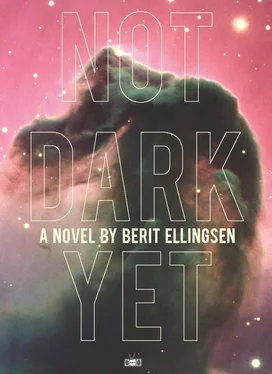As he watched the overcast pale heavens, another plane came down, roared past just above his head, spewing a desperate heat and the stench of gasoline on fire like the draft from a barbecue grill in the summer. He ducked and turned to follow the descent. The fuselage broke up in a shower of smaller pieces before it hit the water, then sank as discreetly and as quietly as the plane that had preceded it. This time he was too far away to hear the screams and cries of the passengers, and was grateful for that.
Almost immediately one of the many cruise ships that roamed the water’s ice-swollen surface, weaving carefully in and out between the wrecks, steered toward the remnants of the fallen. The side of the ship that faced the now-burning victim fuselage was filled with passengers who pointed and yelled to announce the disaster to their fellow travelers. But no life boats were lowered, no life jackets hurled into the still water, no mayday sent out, because they were all there voluntarily, enjoying the sight of the jetsam going down and thanking the multitude of gods that it wasn’t them. As the frozen wrecks out on the oceanic plain rearranged themselves once more to make room for the newcomer another cruiser approached the recent crash.
But beneath him, the ship he was on was also slowly going down. It was already up to the mid-deck railing in bright teal waves. He gazed into the liquid stillness and saw people in evening finery swim from the ship’s windows and out into the searing water. He wondered if his brother and parents were among them, but refused to follow the escaping passengers with his eyes. Instead, he noticed that streams of bubbles were bursting forth from the windows on the lower decks because they had loosened in their frames from the chill and insistency of the ocean.
Now the upper deck had nearly drowned, as if the ship voluntarily let the sea into itself and was embracing it, instead of fighting to keep it out and remain on the surface. Cold wavelets nipped at his naked feet, and he hurried to climb a steel ladder on the wall of the bridge. Another sunken ship was close. Sometime in the past it had settled peacefully on the bottom and now only peeked the apex of its bow, a corner of the roof, and the tallest of its masts above the ice. As he prepared to jump to the other wreck, he saw that other cruise ships were approaching the vessel he was about to leave. They were all ablaze in the flashlight from a thousand cameras, going off to no avail in the bright ocean-light, eager to watch the sinking of the others while already taking in water themselves.
He woke up feeling more tired than when he went to bed, and bleary-eyed from too much sleep. The first thing he did was turn on the laptop and check his mail. A jolt of tension shot through him. There was a message from Kaye:
My dear friend,
I’m so glad you made contact. I sense that you wished to talk more about my work and current situation. This makes me delighted as there are many opportunities with us, which I would be very happy to see you take up.
I’d like to speak with you again in the new year. Please advise.
At first he was so elated that Kaye wanted to meet again that he didn’t reflect on the letter. But as the initial joy receded, he read the mail again and again and found the tone and wording businesslike and stiff, not at all like the brief, informal messages they had exchanged in the city. He wasn’t certain what Kaye wanted from him, but he was too happy not to reply with a date and time to meet.
HE DREADED GOING HOME FOR CHRISTMAS, TO the city, to his family, to the questions, but he had promised Michael and Katsuhiro that he would.
He phoned Beanie to let her know he was planning to return for a brief visit.
“You’re coming home for Christmas?” Beanie said. “When? I’ll stay with Andy over the holidays, he’ll be pleased.” Beanie laughed, sounding a little nervous. He imagined her glancing about in the apartment, assessing what had to be cleaned and how many days she had left till he was there.
“No need for that,” he said. “I’ll take the sofa. I’m just stopping by for a few days. I have to travel south right after New Year’s.”
“But it’s your apartment, your bed,” Beanie said.
“It’s been your apartment for the last months,” he said. “Just give me some clean sheets and the second duvet and I’ll be fine.”
“Are you sure?” Beanie sounded much less tense than before.
“Of course I’m sure,” he said.
“All right. When will you get here?”
“I’ll arrive the evening before the family dinner,” he said. He didn’t want to stay for long in the apartment when it was full of Beanie’s belongings.
“Super!” Beanie said. “The cats and I will be waiting for you.”
“How are they?” he said in order to move the conversation over to a less difficult subject.
“They have been absolute darlings,” Beanie said. “Eating well, purring loudly, curling up to me in bed every night. I love them.”
“I miss you all,” he said and meant it.
“We’ve missed you too and I know the cats are looking forward to seeing you again,” Beanie said. “We all are.”
“I’m looking forward to seeing you as well,” he said.
He wanted to call Michael too, but knowing that if he did, the second thing Michael would ask was how long he’d stay, stopped him. Beanie would disseminate the news anyway.
There wasn’t much to pack. All his good clothes were in the apartment, the gifts he ordered had been sent to the post office in the train station by the honeycomb towers, and the winter and training clothes he had in the cabin would not be needed in the city. He took only the small backpack and it was half full at best, with clean underwear, his wool scarf, leather gloves, wallet, and phone. He walked to the train platform in the foredawn, following the path that snaked through the underbrush. The morning was cold and fog-filled, with a peculiar scent of expectation.
When the train arrived the cars were almost full and he had to push his way through three compartments before he found an empty seat behind two elderly couples that were playing cards. The seat was partially blocked by the seniors’ many pieces of luggage, which there was no room for in the overfilled racks by the door. Even the shelf above the windows was full of bags and backpacks and clothing.
“Pardon me,” he said, squeezing past the pensioners’ suitcases. The far seat was hidden by thick coats and scarves hung on the hook by the window. He put his backpack on the floor and sat down in the aisle seat. As the train arrived at the stops along the coast, it became increasingly delayed and the compartment more and more crowded. In the warm and heavy air he fell asleep between the luggage and the passengers standing in the aisle. Outside, the day brightened slowly, but the light was gray and wan, and would remain only for a few hours. As opposed to earlier in the winter, now the trees in the valleys and the mountainsides were bare, with only the occasional green conifer.
When the train finally clacked into the central train station in his home city, in a web of glinting rails and overhead wires, it had grown dark and most of the passengers were asleep. He picked up his backpack, queued for the doors, and stepped out on the familiar concrete. The wall of noise from people and traffic, the orange glare from the sodium lamps, the scent of sweat, perfume, exhaust, and cigarette smoke, made his months in the mountains instantly vanish.
Another crowded, warm, and noise-filled train took him from the city central to the subterranean steel and glass corridors of the station by the apartment buildings. Bobbing with the crowd, not attempting to run ahead or lag behind, he moved with the throng out the tunnels, up through the park, and into the parking lots below the high-rises. The five six-sided structures rose nineteen floors above the asphalt, the illumination from their rows of windows glittering in the winter night.
Читать дальше












